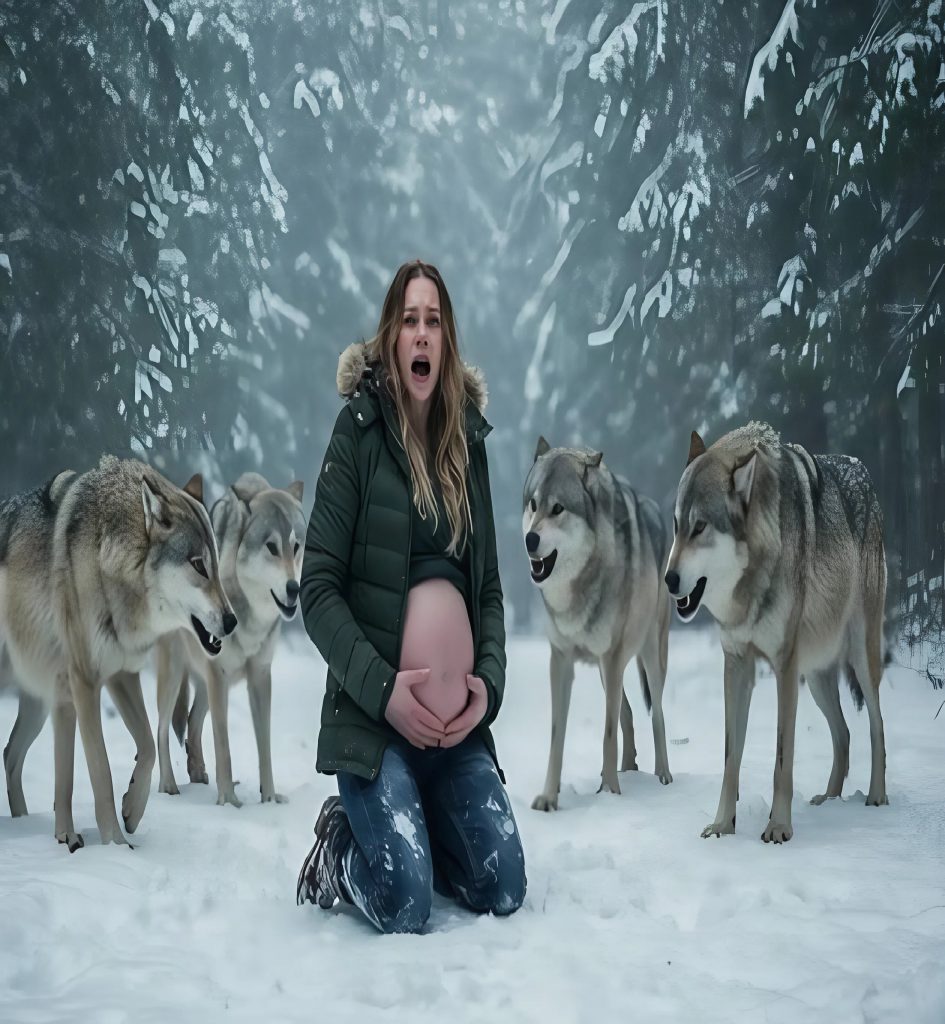It began like any other early morning hike. Emma Carter, 29 years old and seven months pregnant, had always loved the forest. The scent of pine, the rustle of leaves underfoot, and the quiet solitude had been a kind of therapy for her, especially during a difficult pregnancy. But that crisp October morning in the Appalachian woods turned into a nightmare within hours. A wrong turn on an unfamiliar trail, a missed signpost, and a fading phone signal—Emma was lost.
At first, she wasn’t too worried. She had water, some snacks, and a thermal jacket. But as the sun started to dip below the treetops and the cold crept in, anxiety surged. Emma was miles from any town, with no cell service and no clear idea of how to get back. To make matters worse, clouds rolled in. Rain began to fall, soaking her clothes and making the trails slick and dangerous. Exhausted, shivering, and afraid, she found shelter beneath a rocky outcrop.
That’s when she heard it—howls in the distance. Wolves.
Most people believe wolves are dangerous predators, especially in popular folklore where they are often cast as villains. For a pregnant woman alone in the wild, the idea of a pack nearby would spark terror. But what unfolded next was nothing short of extraordinary.
As night fell, Emma was too exhausted to continue walking. Her feet were swollen, her body ached, and she feared for her unborn baby. Then she saw them—three wolves, emerging from the shadows of the trees, eyes gleaming in the moonlight.
Frozen with fear, Emma braced for the worst.
But the wolves didn’t attack.

Instead, they stopped a short distance away, watching her in silence. One, clearly older, sat down, never breaking eye contact. The others remained behind, ears perked, alert but not aggressive. The air was thick with tension, but there was no growling, no snarling—just quiet observation.
Then something even stranger happened.
The elder wolf turned and began to walk away, then stopped, looking back at Emma. It repeated this gesture twice. At first, she thought it was a trick of the light or a fluke of behavior. But the wolf persisted. It was as if… it wanted her to follow.
Driven by desperation and the odd sense of safety the animal inspired, Emma stood and limped after it.
What followed was a surreal, dreamlike journey. The wolves moved slowly, often pausing to let her catch up. They navigated a meandering path through the forest, avoiding dense thickets and steep inclines. Emma followed, half in a trance, too tired to question what she was doing. The wolves never left her side.
Hours passed. Then, just as dawn began to break, Emma saw something ahead: a fire tower, partially hidden by trees. Hope surged in her chest. She stumbled toward it, tears mixing with the rain on her face.
The tower had a working radio. She called for help.
Rescue crews arrived hours later, stunned to find her in good health—tired, dehydrated, but miraculously unharmed. Even more shocking, the wolves were nowhere to be seen.
Emma told the rangers everything. Many were skeptical. Some laughed it off. “Wolves don’t guide people to safety,” they said. But others, especially those who knew the deep wilderness well, said nothing. They had seen strange things out there. Things that defied explanation.
As her story spread, scientists and wildlife experts debated the plausibility of her experience. Could wolves exhibit protective behavior toward humans, especially one in such a vulnerable state? While rare, documented cases do exist of wolves showing curiosity, even empathy, in unusual situations. Some ethologists argued that her pregnancy may have triggered a non-aggressive response from the pack, a kind of instinctual recognition of vulnerability.
Whatever the explanation, Emma’s account captivated the world. It wasn’t just a survival story—it was a rethinking of the boundaries between human and animal, a rare window into the complex and often misunderstood nature of wild creatures.
When Emma gave birth to a healthy baby boy two months later, she named him Elias—a name meaning «Yahweh is my God,» but for her, it also symbolized the mystery and grace of what she experienced in the forest. She often told the story to friends and family, and later to journalists who came knocking, eager to hear it from her own lips.
Her story went viral, not just because of its shock value but because it struck a deeper chord. In a world growing increasingly detached from nature, the tale reminded us of something ancient and powerful—that we are still part of the natural world, and sometimes, nature doesn’t just challenge us.
Sometimes, it saves us.
Whether the wolves sensed her pain, her pregnancy, or something else altogether, no one could say for sure. But Emma never saw them again, and maybe that was the point. Some mysteries are not meant to be solved. They are meant to be remembered, told, and retold—a reminder of what can happen when the wild world reaches out with a hand, not a claw.
 Fact Stream Daily
Fact Stream Daily




